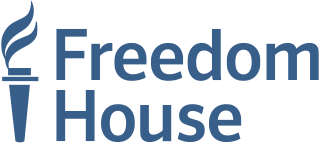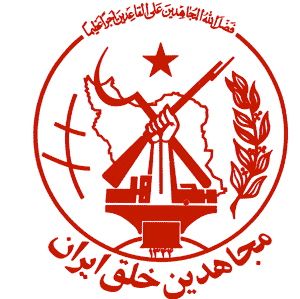
Hamas is a Palestinian Sunni-Islamic fundamentalist, militant, and nationalist organization. It has a social service wing, Dawah, and a military wing, the Izz ad-Din al-Qassam Brigades. It won the 2006 Palestinian legislative election and became the de facto governing authority of the Gaza Strip following the 2007 Battle of Gaza. It also holds a majority in the parliament of the Palestinian National Authority.

Human Rights Watch (HRW) is an international non-governmental organization headquartered in New York City that conducts research and advocacy on human rights. The group pressures governments, policymakers, companies, and individual human rights abusers to denounce abuse and respect human rights, and often works on behalf of refugees, children, migrants, and political prisoners.

Freedom House is a non-profit organization group in Washington, D.C. It is best known for political advocacy surrounding issues of democracy, political freedom, and human rights. Freedom House was founded in October 1941, with Wendell Willkie and Eleanor Roosevelt serving as its first honorary chairpersons. Its mission is to expand and defend freedom globally, and its vision is a world where all are free. Most of the organization's funding comes from the U.S. State Department and other government grants. It also receives funds from various semi-public and private foundations, as well as individual contributions.

The politics of Iran takes place in the framework of an Islamic theocracy which was formed following the overthrow of Iran's millennia-long monarchy by the 1979 Iranian Islamic Revolution.

Evin Prison is a prison located in the Evin neighborhood of Tehran, Iran. The prison has been the primary site for the housing of Iran's political prisoners since 1972, before and after the Islamic Revolution, in a purpose-built wing nicknamed "Evin University" due to the number of students and intellectuals housed there. Evin Prison has been accused of committing "serious human rights abuses" against its political dissidents and critics of the government.

The People's Mojahedin Organization of Iran (PMOI), also known as Mojahedin-e-Khalq (MEK) or Mojahedin-e-Khalq Organization (MKO) (Persian: سازمان مجاهدين خلق ايران, romanized: sâzmân-e mojâhedīn-e khalq-e īrân), is an Iranian dissident organization that was previously armed but has now transitioned primarily into a political advocacy group. Its headquarters are currently based in Albania. The group's ideology is rooted in "Islam with revolutionary Marxism", but after the Iranian revolution became about overthrowing the Government of the Islamic Republic of Iran and installing its own government. At one point the MEK was Iran's "largest and most active armed dissident group", and it is still sometimes presented by Western political backers as a major Iranian opposition group, but it is also known to be deeply unpopular today within Iran, largely due to its siding with Iraq in the Iran–Iraq War.
The constitution of Iran states that the country is an Islamic republic; it specifies Twelver Ja’afari Shia Islam as the official state religion.

The National Council of Resistance of Iran is an Iranian political organization based in France and Albania and was founded by Massoud Rajavi and Abolhassan Banisadr. The organization is a political coalition calling to overthrow the Islamic Republic of Iran. The coalition is made up of different Iranian dissident groups, with its main member being the People's Mujahedin of Iran (MEK). Both organizations are considered to be led by Maryam Rajavi.

Maryam Rajavi is a leader of the People's Mujahedin of Iran (MEK), an organization advocating the overthrow of the Iranian government, and president-elect of its National Council of Resistance of Iran (NCRI). She is married to Massoud Rajavi, who is the co-leader of MEK.

Lesbian, gay, bisexual and transgender (LGBT) people in Iran face severe challenges not experienced by non-LGBT residents. Sexual activity between members of the same sex is illegal and can be punishable by death, and people can legally change their assigned sex only through a sex reassignment surgery.

Kayhan is a newspaper published in Tehran, Iran. It is considered "the most conservative Iranian newspaper." Hossein Shariatmadari is the editor-in-chief of Kayhan. According to the report of the New York Times in 2007, his official position is representative of the Supreme Leader of Iran.

The state of human rights in the Islamic Republic of Iran has been criticized by Iranians and international human rights activists, by writers, and NGOs. The United Nations General Assembly and the Human Rights Commission have condemned prior and ongoing abuses in Iran in published critiques and several resolutions. The government is criticized both for restrictions and punishments that follow the Islamic Republic's constitution and law, and for "extrajudicial" actions by state actors, such as the torture, rape, and killing of political prisoners, and the beatings and killings of dissidents and other civilians. Capital punishment in Iran remains a matter of international concern.
Baháʼís are persecuted in various countries, especially in Iran, where the Baháʼí Faith originated and where one of the largest Baháʼí populations in the world is located. The origins of the persecution stem from a variety of Baháʼí teachings which are inconsistent with traditional Islamic beliefs, including the finality of Muhammad's prophethood, and the placement of Baháʼís outside the Islamic religion. Thus, Baháʼís are seen as apostates from Islam.
Gregory H. Stanton is the former Research Professor in Genocide Studies and Prevention at the George Mason University in Fairfax County, Virginia, United States. He is best known for his work in the area of genocide studies. He is the founder and president of Genocide Watch, the founder and director of the Cambodian Genocide Project, and the Chair of the Alliance Against Genocide. From 2007 to 2009 he was the president of the International Association of Genocide Scholars.
Discrimination against atheists, sometimes called atheophobia, atheistophobia, or anti-atheism, both at present and historically, includes persecution of and discrimination against people who are identified as atheists. Discrimination against atheists may be manifested by negative attitudes, prejudice, hostility, hatred, fear, or intolerance towards atheists and atheism or even the complete denial of atheists existence. It is often expressed in distrust regardless of its manifestation. The main mechanism behind anti-atheist prejudice is the projection of believers' repressed desires. Perceived atheist prevalence seems to be correlated with reduction in prejudice.

Kian Tajbakhsh is an Iranian-American scholar, social scientist, and urban planner. He has taught at both American and Iranian universities. Tajbakhsh is an international expert in the areas of local government reform, urban planning, civil society capacity building, and international public policy research collaboration. He has also directed international projects in the areas of public health and social policy.

From the Imperial Pahlavi dynasty, through the Islamic Revolution (1979), to the era of the Islamic Republic of Iran, government treatment of Iranian citizens' rights has been criticized by Iranians, international human rights activists, writers, and NGOs. While the monarchy under the rule of the shahs was widely attacked by most Western watchdog organizations for having an abysmal human rights record, the government of the Islamic Republic which succeeded it is considered still worse by many.

Sarah Leah Whitson is an American lawyer and the executive director of Democracy for the Arab World Now (DAWN). She previously served as director of the Middle East and North Africa division of Human Rights Watch.
This list of Internet censorship and surveillance by country provides information on the types and levels of Internet censorship and surveillance that is occurring in countries around the world.

The United States has at various times in recent history provided support to terrorist and paramilitary organizations around the world. It has also provided assistance to numerous authoritarian regimes that have used state terrorism as a tool of repression.













